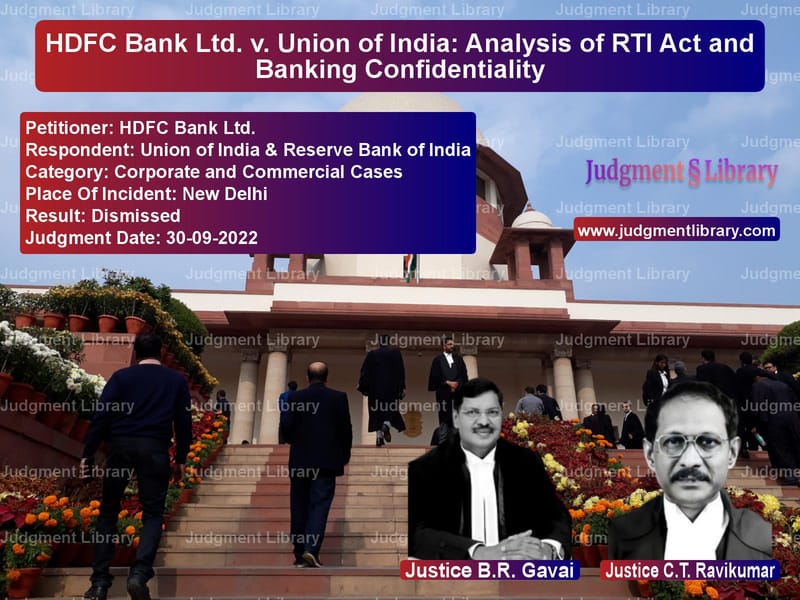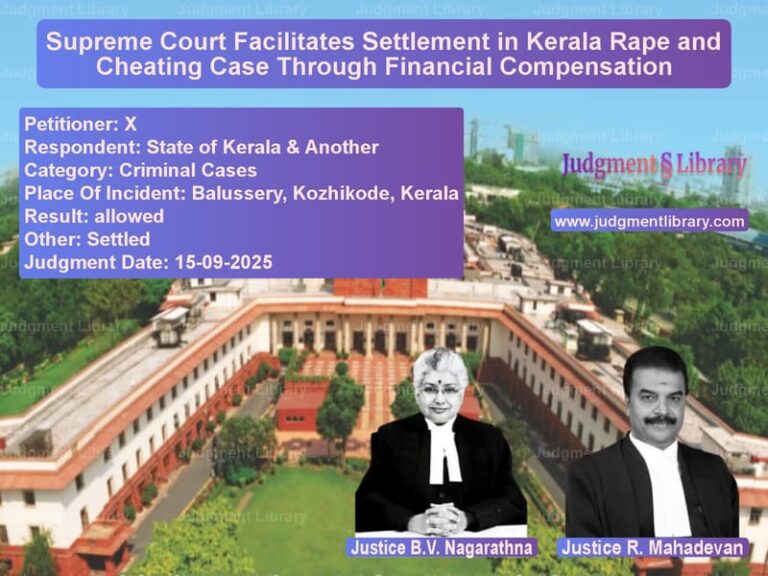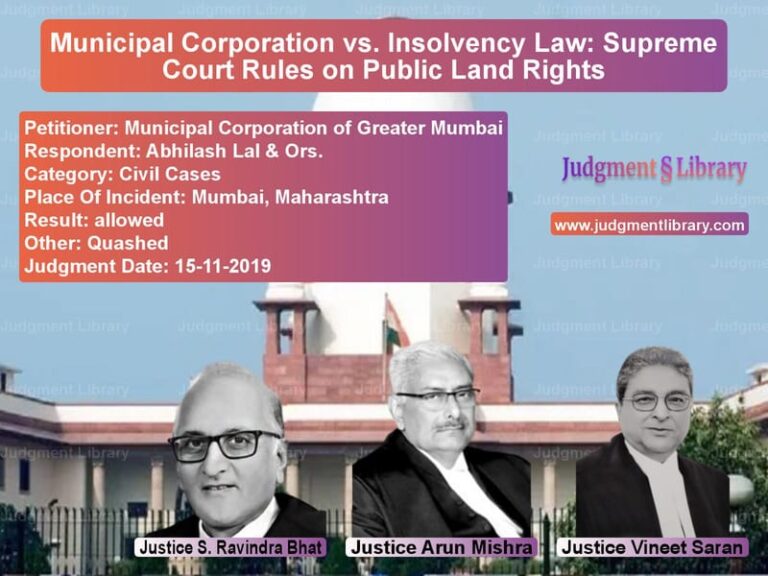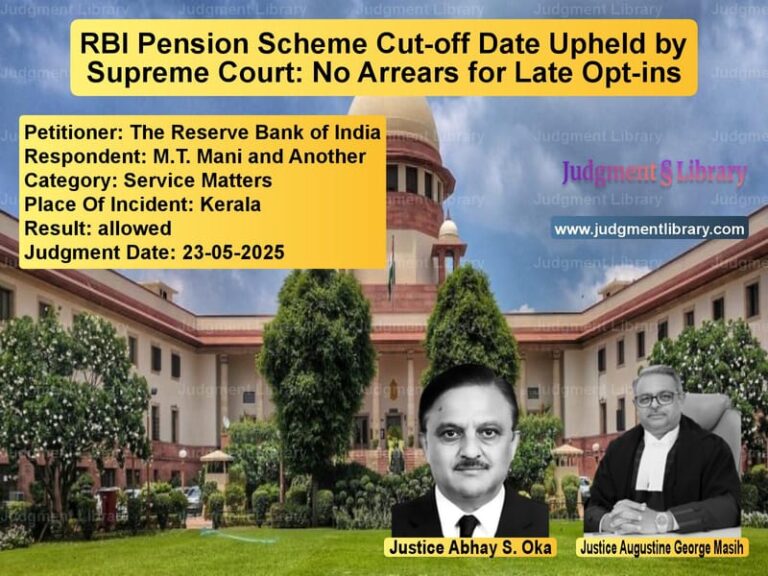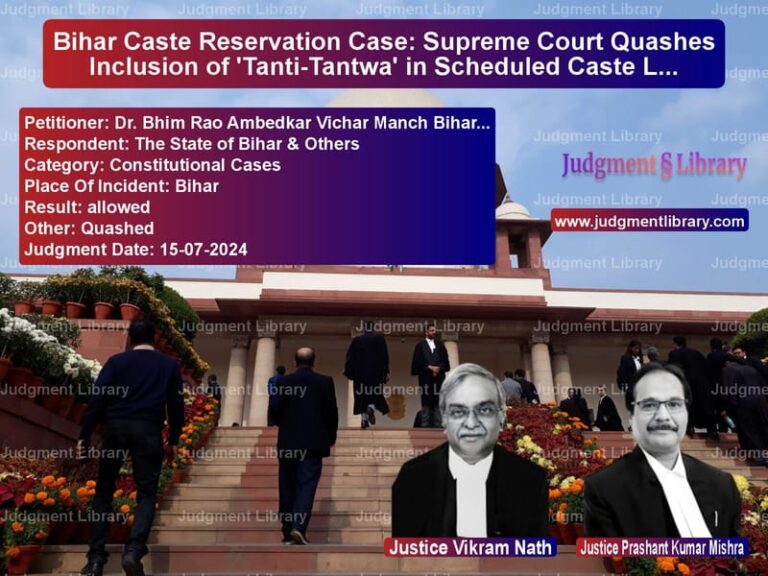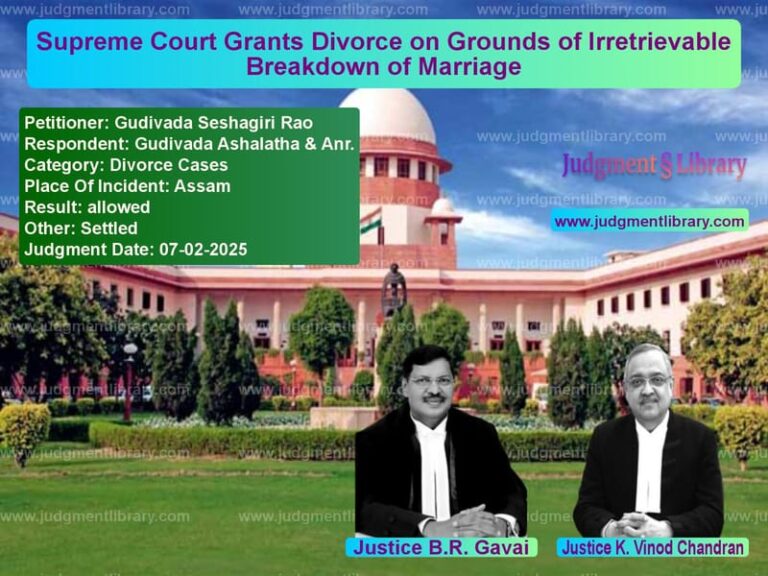HDFC Bank Ltd. v. Union of India: Analysis of RTI Act and Banking Confidentiality
The present case deals with a legal battle between various banks, including HDFC Bank Ltd. (the petitioners), and the Reserve Bank of India (RBI), with the Union of India as a respondent. The issue concerns the banks’ challenge against the RBI’s directive to disclose confidential and sensitive information about their affairs, employees, and customers under the Right to Information Act, 2005 (RTI Act). The petitioners argue that such information should not be disclosed as it falls under the exemptions provided under Section 8 of the RTI Act.
This case is important as it involves balancing two fundamental rights: the right to information, which is part of the Right to Information Act, and the right to privacy, which is also a fundamental right under the Indian Constitution. The petitioners contend that the disclosure of such sensitive data could breach the privacy rights of individuals, including both customers and employees of the banks, and that such disclosures could potentially cause harm to the banking system as a whole.
The petitioners have relied on previous judgments, including the case of Jayantilal N. Mistry vs. Reserve Bank of India, where the Supreme Court dealt with similar issues regarding the RBI’s disclosure obligations under the RTI Act. They argue that the judgment in Jayantilal N. Mistry has already settled the issue, and that the directives from RBI are unjustifiable under the law, as they contradict established legal precedents.
The petitioners also bring to the forefront the confidentiality provisions inherent in the Banking Regulation Act, 1949, and other laws regulating the banking sector, which they argue should take precedence over the RTI Act in this case. They assert that Section 8 of the RTI Act, which provides exemptions to the disclosure of sensitive information, should be invoked in this case. The petitioners have further argued that the RBI’s directive violates the privacy of customers, as their sensitive financial data could be exposed, leading to a breach of trust in the financial system.
The Union of India and the Reserve Bank of India, on the other hand, have defended the directives, stating that the disclosure of certain information is necessary for ensuring transparency in banking operations, particularly with respect to public interest. They argue that the RTI Act mandates transparency in government dealings, and that RBI’s instructions to the banks fall within the legal framework of the RTI Act. The respondents also emphasize that the right to information supersedes concerns of confidentiality in the context of regulatory oversight of the banking sector.
The Union of India’s legal representatives have cited the importance of public accountability, especially in public sector banks, and have pointed out that the disclosure of certain financial details is in the best interest of the public, ensuring that banks remain compliant with financial regulations and laws. They have also stated that banking institutions cannot claim blanket exemptions from transparency, as it is vital for maintaining the integrity of the financial system.
The case has brought forward critical questions about the scope of the RTI Act in balancing the need for transparency with the protection of privacy. This tension is further heightened by the financial sensitivity of the banking sector, where the disclosure of certain information could undermine not only individual privacy but also the stability of the financial system.
The Bench hearing this case consisted of Justice B.R. Gavai and Justice C.T. Ravikumar. They were tasked with addressing the question of whether the RTI Act’s provisions, specifically those dealing with the disclosure of banking information, override the confidentiality rules embedded in banking laws such as the Banking Regulation Act and whether such disclosure would infringe upon the privacy rights of individuals.
The petitioners argued that the right to privacy, which is a fundamental right under Article 21 of the Indian Constitution, must be safeguarded against unwarranted disclosures of personal data. They pointed out that the Supreme Court, in the case of K.S. Puttaswamy vs. Union of India (the Right to Privacy case), had recognized the right to privacy as an intrinsic part of the fundamental right to life and personal liberty. Therefore, according to the petitioners, the right to privacy should take precedence over the need for transparency under the RTI Act in this case.
On the other hand, the respondents, including the RBI, argued that the right to information is equally a fundamental right under the Indian Constitution. They stated that transparency in governance, including banking operations, ensures accountability and prevents corruption. They also emphasized that the RTI Act provides specific exemptions under Section 8, which the respondents argued could be applied to shield certain sensitive information from disclosure.
The core of the dispute revolves around the interpretation of Section 8 of the RTI Act, which exempts certain information from disclosure, particularly when it concerns commercial confidence, trade secrets, or intellectual property, or when disclosure of the information would harm the sovereignty and integrity of India. The petitioners have argued that the exemption under Section 8 applies in this case, as the disclosure of confidential banking information could potentially jeopardize the commercial interests of the banks and harm customer privacy.
Furthermore, the petitioners pointed out that the previous judgment in Jayantilal N. Mistry had already dealt with the issue of disclosure of sensitive banking information, and the Supreme Court had clearly outlined the exemptions available under the RTI Act in such matters. They have argued that the current petition is not maintainable, as the issue has already been conclusively settled by the Supreme Court.
However, the respondents contended that the issue raised in the present petitions is different from the one dealt with in Jayantilal N. Mistry, as it pertains to the specific provisions of the RTI Act and the need for regulatory oversight in the banking sector. The respondents argued that the RTI Act cannot be disregarded in favor of other laws such as the Banking Regulation Act, as the RTI Act specifically mandates disclosure to promote transparency in government dealings.
The petitioners also made submissions based on the principles of natural justice, arguing that the RBI’s actions in directing the disclosure of sensitive banking information were arbitrary and lacked proper procedural safeguards. They emphasized that the confidentiality of banking information is crucial for the functioning of the financial system and that exposing such sensitive data to public scrutiny could lead to an erosion of public trust in the banking sector.
The Supreme Court had to weigh these competing interests: the need for transparency and accountability in government and banking operations, and the protection of individual privacy and commercial confidentiality. In reaching its decision, the Court had to determine whether the disclosure of sensitive banking information could be justified in the public interest, or whether such disclosure would violate the privacy rights of the banks’ customers and employees.
After hearing both sides, the Court considered the broader implications of the case for banking confidentiality and privacy rights. It acknowledged the importance of transparency in financial institutions but also recognized the concerns raised by the petitioners regarding privacy. The Court emphasized the need for a careful balance between the competing interests of public accountability and the protection of individual privacy and commercial confidentiality.
The Court ultimately dismissed the petitions, ruling that the RBI’s directive to disclose certain banking information was consistent with the provisions of the RTI Act. The Court held that while the right to privacy is a fundamental right, it must be balanced against the public interest in transparency and accountability in the banking sector. The Court also ruled that the exemptions under Section 8 of the RTI Act could not be invoked to prevent the disclosure of information that is deemed to be in the public interest.
In conclusion, the Court’s decision has important implications for the banking sector and the application of the RTI Act. It reinforces the principle that the RTI Act should be interpreted in a way that promotes transparency in public institutions, while also ensuring that the right to privacy is not unduly compromised. The case highlights the need for clear guidelines on how sensitive information in the banking sector should be handled under the RTI Act, and it underscores the importance of balancing transparency with the protection of privacy in the digital age.
Petitioner Name: HDFC Bank Ltd..Respondent Name: Union of India & Reserve Bank of India.Judgment By: Justice B.R. Gavai, Justice C.T. Ravikumar.Place Of Incident: New Delhi.Judgment Date: 30-09-2022.
Don’t miss out on the full details! Download the complete judgment in PDF format below and gain valuable insights instantly!
Download Judgment: hdfc-bank-ltd.-vs-union-of-india-&-res-supreme-court-of-india-judgment-dated-30-09-2022.pdf
Directly Download Judgment: Directly download this Judgment
See all petitions in Contract Disputes
See all petitions in Damages and Compensation
See all petitions in Public Interest Litigation
See all petitions in Judgment by B R Gavai
See all petitions in Judgment by C.T. Ravikumar
See all petitions in dismissed
See all petitions in supreme court of India judgments September 2022
See all petitions in 2022 judgments
See all posts in Corporate and Commercial Cases Category
See all allowed petitions in Corporate and Commercial Cases Category
See all Dismissed petitions in Corporate and Commercial Cases Category
See all partially allowed petitions in Corporate and Commercial Cases Category

